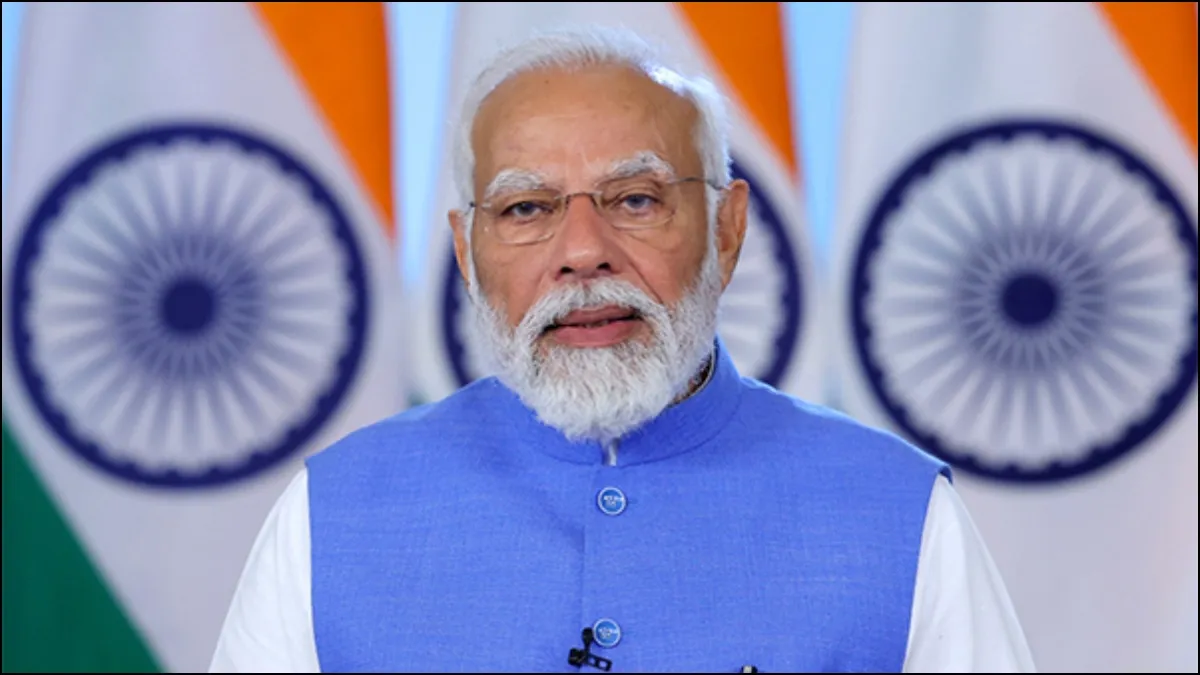New Delhi: Prime Minister Narendra Modi, while noting that India's relationship with China is important, has stressed the urgency of addressing the "prolonged situation" on the borders in order to put behind the "abnormality in bilateral interactions" between the two countries so that peace and tranquillity are restored in the disputed areas through constructive engagement.
In an interview with the weekly US news magazine Newsweek, PM Modi said that India, as a democratic polity and global economic growth engine, is a natural choice for businesses looking to diversify their supply chains. His remarks came during a 90-minute conversation with Newsweek following written questions by the American publication. He is the second Indian PM to feature on the Newsweek cover after Indira Gandhi.
He asserted that peaceful and stable relations between India and China are important for not just the two countries but the entire region and world. "For India, the relationship with China is important and significant. It is my belief that we need to urgently address the prolonged situation on our borders so that the abnormality in our bilateral interactions can be put behind us," he said.
“I hope and believe that through positive and constructive bilateral engagement at the diplomatic and military levels, we will be able to restore and sustain peace and tranquillity in our borders,” he added. PM Modi also said that the Quad grouping - comprising India, the US, Australia and Japan - is not targeted towards any country and the members are present in several multilateral groups.
PM Modi further mentioned that the Indo-Pacific region is the engine of global trade, innovation and growth and the security of the Indo-Pacific is important not only to the region, but to the world.
PM Modi on India's competition with China
While responding to a question on competition with China, PM Modi shed light on India's own transformative economic reforms and said the latter country is now being considered most suited for manufacturing world-class goods at a competitive cost. He said India is a perfect destination for those who want to set up trusted and resilient supply chains and the domestic market is an added attraction.
"We have undertaken transformative economic reforms: Goods and Service Tax, corporate tax reduction, bankruptcy code, reforms in labour laws, and relaxation in FDI norms. As a result, we have made significant improvements in ease of doing business. We believe that when a country with one-sixth of the world's population adopts global standards in these sectors, it will have a big positive impact on the world," he said.
The Indian leader said that New Delhi's policies that focus on businesses and entrepreneurship, coupled with world-class infrastructure and availability of skilled talent, have yielded results. "We have major global manufacturing entities setting up shops in India. We have initiated Production Linked Incentive schemes to strengthen manufacturing capabilities in India. These PLI schemes extend to 14 sectors such as electronics, solar modules, medical devices, automobiles, among others," he added.
PM Modi further mentioned that the Indo-Pacific region is the engine of global trade, innovation and growth and the security of the Indo-Pacific is important not only to the region, but to the world.
India-China border disputes
The Indian and Chinese troops are locked in a standoff in certain friction points in eastern Ladakh even as the two sides completed disengagement from several areas following extensive diplomatic and military talks. The eastern Ladakh border standoff erupted on May 5, 2020, following a violent clash in the Pangong Tso (lake) area. The eastern Ladakh standoff has resulted in a freeze of bilateral ties on all fronts except trade. The two sides have so far held 21 rounds of corps commanders-level talks to resolve the standoff.
India-China relations remain frozen since May 2020 after the Galwan border clash near the LAC. India is pressing the People's Liberation Army (PLA) of China to disengage from the Depsand and Demchok areas. While India has maintained that there cannot be restoration of normalcy in its relations with China as long as the state of the borders remains abnormal, China continues to press India to delink the border issue and bilateral relations and work for normalcy.
China has stressed multiple times that the boundary question does not represent the entirety of the China-India relations, which should be placed appropriately in the bilateral relations and managed properly. The two countries have held a series of meetings between senior commanders and of Working Mechanism for Consultation and Coordination on India–China Border Affairs (WMCC).
(with inputs from agencies)
ALSO READ | PM Modi wishes Maldives President Mohamed Muizzu on Eid-ul-Fitr amid frosty relations

